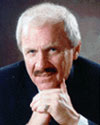Marketing to Seniors: Age Really is a State of Mind
When marketing to seniors, attitude is more important than age.

In the U.S.'s future, marketing to seniors will become even more important as the group of those 65-years and older nearly doubles in size: from 37 million to 72 million by 2030.
 Tom Barry |
There are already entire cottage industries marketing to them, whether in consumer goods, financial services or health care. International marketers want to know how to reach seniors as well. New research about segmenting Japanese seniors reveals that chronological age is not the best metric to use in segmenting this group, and this fact holds true for those marketing to Westerners, too.
For over 20 years, Marketing Professor Tom Barry of SMU's Cox School of Business has been researching the senior market segment alongside his co-author Stuart Van Auken of Florida Gulf Coast University, who specializes on the international side. This research builds on their prior work published in top journals. A focal point of the research is the notion of "cognitive" age, the age that one feels or sees oneself as.
"Cognitive age is one's 'feel age,' that is how old you feel, which is both self-reported and scientifically measured," says Barry. "You can measure this notion of cognitive age well both domestically and overseas."
Generally those with a younger outlook than their actual age should evidence better health, which influences personal economics, life satisfaction, attitudes toward aging, and activities and level of participation in organizations.
 Stuart Van Auken |
The two groups which emerged from the study — the cognitively younger and the cognitively older — display tendencies geared toward these top activities: reading books, social club membership, shopping in department stores, dining out and taking photographs. A next level of popular activities were visiting art galleries or museums and using computers. The cognitively younger seniors were engaged in more activities than were the cognitively older seniors.
The message to marketers is to focus on feel age, not real age. "This study says natural age is not a good descriptor or discriminator upon which to base segments," Barry says. "You see it all the time in varied demographic groupings like 29-40 year-old females, 55- 64 year-old married couples, etc. But there are so many psychological variations of age within those segments. We segment in this way because it is easy and we can."
Barry acknowledges that there are some demographics that are useful for segmenting, but importantly cognitive age is a driver. He suggests using this in persuasive messages.
"Use models that are cognitively younger; they don't have to look younger, but have a persona that is psychologically younger. The content of advertising, sales, and marketing messages should be cognitively based. For example, we don't use medicine to avoid osteoporosis because we are afraid our bones will break, but because we want to go to the museum and play golf."
Age is really a state of mind. Everyone knows this intuitively, but it is scientifically validated by the study. "We are trying to understand why people do things- what's inside the black box of the mind," Barry concludes. "Marketing is not rocket science; there's a lot of intuition about it."
# # #